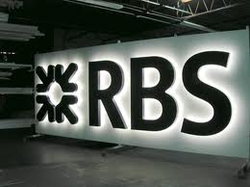On August 24, 2012, Reuters news agency reported the amicable proceedings of Royal Bank of Scotland to obtain a transaction in the case of the Libor.
http://www.thejournalofregulation.com/spip.php?article1589

The Royal Bank of Scotland (RBS) is a British Bank controlled to 80% by the State. It is said involved in the case of the Libor. On August 24, 2012, Reuters news agency reported links between the Royal Bank of Scotland (RBS) and the British and North American regulators to stop the intended prosecution through a settlement. The interest is not in the subject of the announcement, but in the formulation. Indeed, the Bank denies the existence of this mutual understanding. Less than a month ago, it claimed that it would face prosecution and a few weeks ago, it claimed that it could be actions of traders and not its own, taken as operators. Today, these are lawyers who reveal the strategy of negotiations with the regulator. Thus, what made the right hand of the Bank, the left hand of the Bank ignores it and can do something else; the essential was to reassure the market.
© thejournalofregulation
The case of Libor places in great danger the banking system, which stands on the woven fabric primarily by the banks themselves, unlike the financial market. The Libor, being a declaratory system, because it raised doubts on the very principle of the word of banks in that this one produces rates on which are adjusted the transactions of the others, weaken this word, it is undermining the whole.
This is why the International Monetary Fund (IMF), through the statements of Christine Lagarde, was alarmed by the case of Libor, the name of the global balance of markets and of its financing.
The report by Reuters news agency on August 24, 2012 is interesting because it reflects how a bank involved, here the Royal Bank of Scotland (RBS), may take several speeches, according to speakers at the same time.
In 2008 and 2009, this Bank has been hit by the financial crisis and the British State has intervened by taking its control to 80%. We are thus in a somewhat special situation, because it is the State itself which is the operator, even on a market, the property of the capital has no importance, this dogma of competition law being particularly resumed in English banking law. It remains that we could wait to a bank "held" by the State Bank to have a more strict behaviour than to a single operator.
When the authorities have indicated that they are considering legal action against the State bank, the first reaction of the Royal Bank of Scotland (RBS) was to say on August 3, 2012, through an interview in The Guardian, that it would face procedure, having dismissed the traders who had in any duplicity committed indiscretions. But a Member of Parliament John Mann, Member of the Finance Committee of the Parliament, who has made public a very severe report for regulators especially for the Financial Services Authority (FSA) indicated on 24 August 2012 to the Reuters news agency that the internal operating of the Royal Bank of Scotland (RBS), including the internal control, is even more unsatisfactory than the Barclays.
Then, at the same time, two lawyers explain that the Royal Bank of Scotland (RBS) has "probably" negotiated with British and American regulators as the Barclays did. What a great way to reassure markets. While legal advisers point out that the presence of the British State in the Bank requires rapid clarification of the situation, because the regulator is itself public. In this the context of so many words orchestrated, it is effectively sufficient that the Royal Bank of Scotland (RBS) refused to make any comment...

your comment